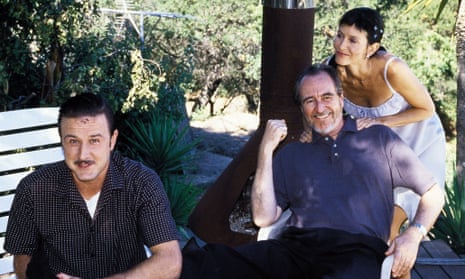If you can judge a film-maker’s influence by how many copycats they inspire, then Wes Craven has to be seen as one of the most influential. Three times he changed his mind about what horror movies should be, and three times we were promptly flooded with all manner of dodgy knock-offs.
The Last House on the Left (banned in the UK on two separate occasions) was one of the most important horror films ever made. Craven decisively removed everything that could have been mistaken as a genre signifier. The finished product had no monsters, no ghosts, no schlocky mention of blood in the title; just an endless parade of nightmarish real-life violence. People are raped, throats are slit, innards are disembowelled. It isn’t exactly a fun watch.
And yet The Last House on the Left captured the public mood. It was released into a world reeling from the Manson murders, Vietnam, Altamont and Nixon, and it hit all its marks perfectly. The fact that it was made for less than $90,000, which gave it a rough-and-ready vérité look that just made the horrors seem more real, only magnified its impact. Without The Last House on the Left, there’d be no Texas Chainsaw Massacre, no I Spit on Your Grave, no Halloween. Its advertising campaign (“It’s only a movie, it’s only a movie”) handed more power to marketers and films as varied as Fargo and Paranormal Activity owe a lot to its “The following is based on a true story” misdirect.
Many directors would rest on their laurels after making a film like The Last House on the Left, but not Wes Craven. After Hollywood co-opted his beloved genre and diluted it for public consumption, Craven was left with no choice but to join in and make the definitive Hollywood slasher movie. A Nightmare on Elm Street was little short of a phenomenon. Swapping out Last House’s grainy realism for something more muscular and flashy – yet somehow even more blood-drenched – Nightmare managed to become the definitive horror of the 1980s. It made its budget back 20 times over, it established New Line as a powerhouse, and it transformed Freddy Krueger into a global icon. Again, the pale imitations came pouring in, including the film’s own sequels.
Craven had an arm’s-length relationship with the Nightmare spawn, watching as his deformed serial killer character became little more than a campy quip machine. Then in 1994, he retook the reins. Wes Craven’s New Nightmare was a bizarre postmodern almost-spoof where Robert Englund and Heather Langenkamp played themselves and the ending involved a hand-written note from Wes Craven (who also stars as himself) thanking the actors for definitively killing Freddy Krueger. It doesn’t really hold up as a film, but it set the scene for Craven’s final masterpiece.
While this rule-breaking and genre-bending was borne of frustration, it had ended up with him making Scream. Although written by Kevin Williamson, the script mirrored Craven’s own uneasy feelings about the state of horror at the time, and gave him the perfect vehicle with which to give it a kicking. Cliches were satirised, tropes were torn apart and seemingly no plot point would go uncommented on by one character or another. At the time it was a revelation. However, the copycats it inspired – like I Know What You Did Last Summer, H20, Urban Legends and Final Destination – once again diminished its impact over time.
As such, despite later works like Soul to Take, Scream would be the last time that Wes Craven would reinvigorate horror. Where it’ll go without him is anyone’s guess.

Comments (…)
Sign in or create your Guardian account to join the discussion